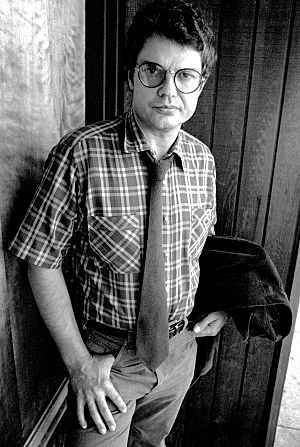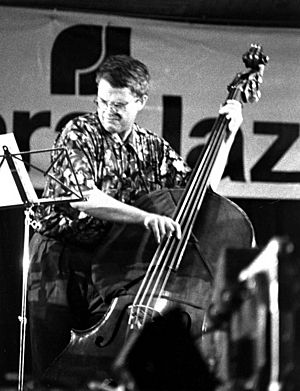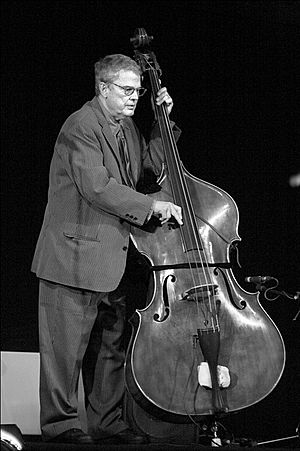Charlie Haden facts for kids
Quick facts for kids
Charlie Haden
|
|
|---|---|

Haden in 1981
|
|
| Background information | |
| Birth name | Charles Edward Haden |
| Born | August 6, 1937 Shenandoah, Iowa, U.S. |
| Died | July 11, 2014 (aged 76) Los Angeles, California, U.S. |
| Genres |
|
| Occupation(s) | Musician, composer, bandleader, educator |
| Instruments | Double bass |
| Years active | 1957–2014 |
| Associated acts | |
Charles Edward Haden (born August 6, 1937 – died July 11, 2014) was an American jazz musician. He was a double bass player, bandleader, composer, and teacher. His music career lasted over 50 years.
Charlie Haden changed how the bass was played in jazz. Before him, the bass mostly kept the rhythm. Haden made it a more active part of the music. He would sometimes play along with the main soloist. Other times, he would play his own melodies. This helped bass players become more involved in the music.
In the late 1950s, he was a first member of the famous Ornette Coleman Quartet. In 1969, he started his own band, the Liberation Music Orchestra. This group played music with a strong message. He also played with pianist Keith Jarrett's groups. In the 1980s, he formed his band, Quartet West. Haden also loved playing in duos, with just one other musician. He played with guitarist Pat Metheny and pianist Hank Jones.
A music expert named Joachim-Ernst Berendt said Haden was amazing. He could create beautiful new harmonies on the spot. He made the double bass "sound out" in a special way. Haden was a master of making complex music sound simple.
Contents
Biography
Early life and start in music
Charlie Haden was born in Shenandoah, Iowa. His family loved music and performed on the radio as the Haden Family. They played country music and American folk songs. Charlie started singing with his family when he was only two years old. He continued until he was 15. At that age, he got very sick with polio. This illness affected his throat and face muscles. It made it hard for him to sing.
When he was 14, Haden became interested in jazz. He heard famous musicians like Charlie Parker. After he got better from polio, Haden focused on playing the bass. He loved the bass not just for jazz, but also for the harmonies he heard in music by Bach. Haden dreamed of becoming a jazz musician in Los Angeles. To save money, he worked as a bass player for a TV show called Ozark Jubilee.
Early career in Los Angeles
In 1957, Haden moved to Los Angeles. He wanted to play with pianist Hampton Hawes. He turned down a scholarship to a college to go to a music school in Los Angeles. He made his first recordings that year with Paul Bley. He also played with Art Pepper and Hampton Hawes. For a while, he even shared an apartment with another bass player, Scott LaFaro.
In May 1959, Haden recorded his first album with the Ornette Coleman Quartet. This album was called The Shape of Jazz to Come. Haden's folk-influenced style fit well with Coleman's unique sound. Later that year, the Quartet moved to New York City. They played for many weeks at a club called the Five Spot Café. This was the start of their special, free jazz style. The band played everything by ear. Haden explained that Ornette would just play, and he would follow. He would create new chords on the spot based on how Ornette felt.
In 1960, Haden left Coleman's band. He later met his first wife, Ellen David. They had four children: their son, Josh, and triplet daughters Petra, Rachel, and Tanya.
Music and activism (1964-1984)
Haden started playing music again in 1964. He worked with saxophonist John Handy and pianist Denny Zeitlin. He also played with Archie Shepp and other musicians. He rejoined Ornette Coleman's group in 1967. Haden was known for being able to follow Ornette's changing music.
Haden also joined Keith Jarrett's trio and 'American Quartet'. This group included drummer Paul Motian and saxophonist Dewey Redman. He also helped form a group called Old and New Dreams. This band played music by Ornette Coleman and their own songs.
In 1970, Haden received a special award for music composition. He also received grants for his music over the years.
Haden started his first band, the Liberation Music Orchestra (LMO), in 1969. He worked with arranger Carla Bley. Their music was very experimental. It mixed free jazz with political messages. Their first album focused on music from the Spanish Civil War. Haden was also inspired by the events of 1968 in Chicago. He mixed songs like "You're a Grand Old Flag" with "We Shall Overcome".
The LMO had many talented musicians over the years. They came from different backgrounds. The group won several awards in 1970, including France's Grand Prix du Disque.
In 1971, Haden was on tour with Ornette Coleman's band in Portugal. Portugal was under a strict government at the time. Haden dedicated a song to people fighting for freedom in other countries. The next day, he was stopped at the airport and questioned. He was only released after Ornette Coleman spoke up. Later, he was even questioned by the FBI in the United States.
Haden formed the LMO because he was upset about the Vietnam War. He felt the government spent too much energy on war. He thought they ignored problems at home, like poverty. Haden wanted the LMO to give a voice to people who were not heard. He wanted to show support for movements around the world that sought change. The LMO's 1982 album The Ballad of the Fallen spoke about the Spanish Civil War and US actions in Latin America. The LMO toured a lot in the 1980s and 1990s.
In 1990, the orchestra released Dream Keeper. This album was inspired by a poem by Langston Hughes. It also used American gospel music and South African music. It spoke about racism in the US and apartheid in South Africa. In 2005, Haden released the fourth LMO album, Not in Our Name. This album was a protest against the US invasion and occupation of Iraq.
In 1982, Haden started the Jazz Studies Program at California Institute of the Arts. He taught students to find their own musical style. He encouraged them to connect with the creative process. Haden was honored as "Jazz Educator of the Year" for his teaching. Some of his students included John Coltrane's son, Ravi Coltrane.
Later career and collaborations (1984-2014)
In 1984, Haden met singer and actress Ruth Cameron. They got married. Ruth managed Haden's career and helped produce many of his albums.
In 1986, Haden started his band Quartet West. Ruth suggested the idea. The band included Ernie Watts on sax, Alan Broadbent on piano, and Billy Higgins on drums. They played original songs by Haden and Broadbent. They also played old pop songs from the 1940s. They gave these songs a cool, jazz sound.
In 1989, Haden started a special concert series at the Montreal Jazz Festival. He performed with different musicians for eight nights. Most of these performances were recorded and released as The Montreal Tapes.
In 1994, Ginger Baker, the famous drummer from the band Cream, formed a trio with Haden and guitarist Bill Frisell.
Haden loved playing in duets, with just one other musician. He enjoyed the close feeling of this format. In 1995, Haden released Steal Away: Spirituals, Hymns and Folk Songs with pianist Hank Jones. This album featured traditional spirituals and folk songs. In 1996, he worked with guitarist Pat Metheny on the album Beyond the Missouri Sky (Short Stories). This album explored music that influenced them when they were kids. Haden won his first Grammy award for this album.
In 1997, a classical composer named Gavin Bryars wrote a piece for Haden. It was recorded with the English Chamber Orchestra. This music blended jazz and classical styles.
Final years and recognition (2000-2014)
In 2001, Haden won a Latin Grammy Award for his album Nocturne. This album featured traditional Latin American songs. In 2003, he won another Latin Grammy for his album Land of the Sun. In 2005, he brought the Liberation Music Orchestra together again. They released Not In Our Name, which spoke about current political issues in the United States.
In 2008, Haden and his wife Ruth produced the album Charlie Haden Family and Friends: Rambling Boy. This album featured many members of his family, including his triplet daughters and son Josh. Famous musicians like Béla Fleck, Pat Metheny, and Elvis Costello also joined them. The album brought back Haden's early days of playing country and bluegrass music with his family. It included songs by famous artists like the Stanley Brothers and Hank Williams.
In 2009, a film about Haden's life, called Rambling Boy, was released. That same year, Haden performed with Ornette Coleman again in London. He also recorded duets with pianist Kenny Barron and Hank Jones. The album with Hank Jones, Come Sunday, was recorded shortly before Jones passed away.
Awards:
- In 2012, Haden received the NEA Jazz Masters Award.
- In 2013, Haden received the Grammy Lifetime Achievement Award.
- In 2014, Haden received a special award from the French Ministry of Culture.
Music released after his death: In September 2014, three months after Haden passed away, an album called Charlie Haden-Jim Hall was released. It was a recording of a duet performance from 1990. Haden worked on this album even when he was very sick. In June 2015, another album, Tokyo Adagio, was released. It was a collaboration with Gonzalo Rubalcaba from 2005.
Legacy
Beliefs and teaching
Charlie Haden was interested in spirituality, especially how it connected to music. He believed artists should bring beauty to the world. He taught his students to find their own unique musical voice. He also told them to focus on the present moment. He said, "there's no yesterday or tomorrow, there's only right now." Haden believed that music teaches important lessons about life. He said, "When you're in the midst of improvisation, there is no yesterday and no tomorrow—there is just the moment that you are in."
Musical ideas
Haden saw jazz as "music of rebellion." He felt it was his job to challenge the world through music. He believed all music came from the same place. Because of this, he didn't like to put music into strict categories. He was open to working with many different musicians. His music, especially with the LMO, was about people fighting for freedom. He once said his music was for those who "dream of a society with compassion... and a respect for the preciousness of life."
Playing style
Haden was known for his warm sound and gentle vibrato on the double bass. He believed the bass player should be a direct part of the group's improvisation. This was clear in his work with Ornette Coleman. He would often create new melodies in response to Coleman's solos. When he played, he often closed his eyes. He would bend over his bass until his head was almost at the bottom.
Pianist Ethan Iverson said Haden's style was unique. It combined folk music, modern jazz, and classical harmony.
Haden owned two basses. One was a very special bass made by a French craftsman in the 1800s. He only played this valuable bass for recordings or nearby concerts. He didn't want to risk damaging it.
Haden suffered from tinnitus, a ringing in his ears. He believed it came from playing near loud drums. Because of this, he sometimes had to play behind a clear screen.
Keith Jarrett, who played with Charlie, said Haden always wanted to connect with the music in a very personal way. He wasn't someone who would just play a simple rhythm.
Personal life
Charlie Haden's son Josh Haden is a bass guitarist and singer. His daughters, Petra, Tanya, and Rachel, are all singers and musicians. Petra plays the violin, Rachel plays piano and bass guitar, and Tanya plays the cello. They have a band called The Haden Triplets. Comedian and actor Jack Black is his son-in-law, married to Tanya.
Charlie Haden passed away in Los Angeles on July 11, 2014, at age 76. He had been dealing with health issues from polio and liver disease. A memorial concert was held in New York City in January 2015. His wife Ruth organized it. Musicians, family, and friends gathered to remember his life.
Discography
- 1976: Closeness (1976)
- 1976: The Golden Number (1977)
- 1976: As Long as There's Music (1978)
- 1978: Gitane (1979)
- 1979: Mágico (1980)
- 1979: Folk Songs (1981)
- 1987: Etudes (1989)
- 1987: Silence (1987)
- 1990: Dialogues (1990)
- 1991: Haunted Heart (1992)
- 1990: First Song (1992)
- 1994: Steal Away (1995)
- 1996: Beyond the Missouri Sky (Short Stories) (1997)
- 1997: None But the Lonely Heart (1997)
- 2000: Nocturne (2001)
- 2002: American Dreams (2002)
- 2003: Land of the Sun (2004)
- 2005: Tokyo Adagio (2015)
- 2006: Heartplay (2006)
- 2010: Come Sunday (2012)
See also
 In Spanish: Charlie Haden para niños
In Spanish: Charlie Haden para niños
 | Laphonza Butler |
 | Daisy Bates |
 | Elizabeth Piper Ensley |



